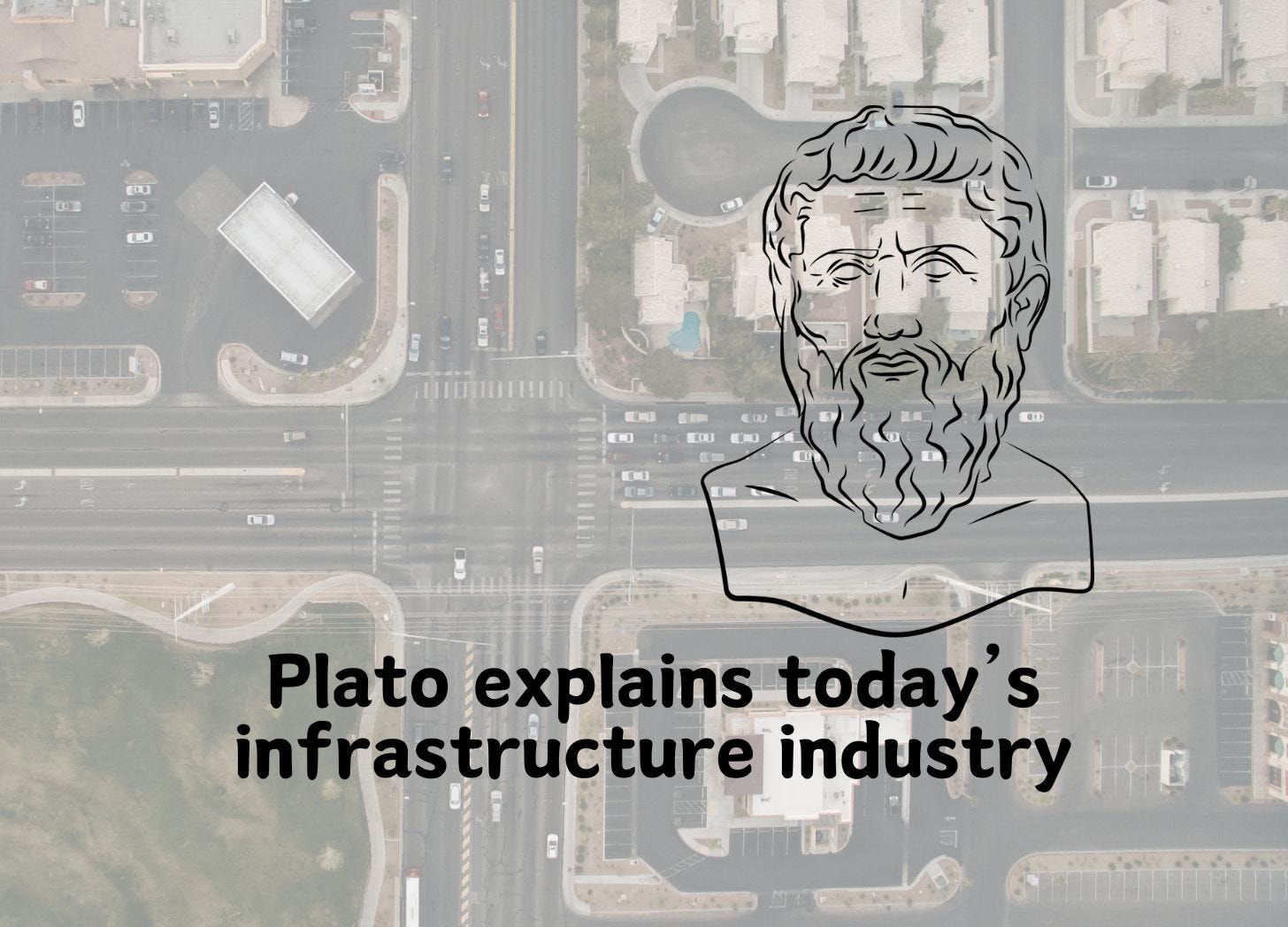The urbanist's journey out of the cave
Plato's "The Republic" sheds some light on why some people just won't change their planning & engineering ways.
If there’s so much information about building better places, then why aren’t more experts taking action? If so many success stories of good urbanism are freely available online, then why aren’t more people demanding reform?
Socrates, Plato's mentor, narrates the allegory of the cave from “The Republic”:
Imagine human beings living in an underground cave with an entrance open to the light and a long passage all down the cave. Here they have been from their childhood, chained by the leg and also by the neck so that they cannot move and see only what is in front of them, because the chains will not let them turn their heads.
At a distance above and behind them the light of a fire is blazing, and between the fire and the prisoners there is a raised way; and you will see, if you look, a low wall built along the way, like the screen which marionette players have before them, over which they show the puppets.
On this wall, then, the things being done appear to be the shadows of men and other objects, which the fire casts on the wall of the cave opposite where the prisoners are seated.
Moreover, if they were able to talk to each other, don't you think they would consider that they were naming what was actually before them?
And suppose further that there was an echo which came from the wall, would they not be sure to think when one of the passers-by spoke that the voice which they heard came from the passing shadow?
To them, the truth would be literally nothing but the shadows of the images.
Is it really that much of a stretch to imagine professional planners and engineers working their entire careers in the dark cave? All they know are the shadows on the wall.
In Plato’s story, one of the prisoners breaks free from their chains and ventures out of the cave into the outside world. Here’s what escaped planner or engineer experienced next:
Blinding Light. As the freed professional turns away from the cave wall and faces the entrance, the brightness of the outside world is blinding. It’s a disorienting and painful experience, encountering the truth about the status quo industry for the first time.
Adjustment to the Real World. Over time, the eyes adjust, and they begin to see the true nature of the outside world. They see what human flourishing can look like.
Knowledge and Enlightenment. They come to understand that the shadows on the cave wall were mere illusions. The more they learn, the more they want to learn.
Desire to Return. Filled with newfound understanding, the freed professional feels a deep desire to return to the status quo cave and share what they’ve learned with coworkers and clients.
Resistance from Peers. The professional returns to the cave and tries to explain the true human experience to the other prisoners. The prisoners are comfortable with their world of shadows, and aren’t buying the wild tales from outside.
There’s obviously a liberation that comes from learning enough to distinguish illusion from reality. But when you return to the status quo cave to share what you’ve learned, don’t be surprised when you face skepticism and resistance from your peers.



A good friend of mine was a senior urban planner in Amsterdam. Now she lives in LA. She showed me videos of fistfights in the streets over car space in streets (from the 70s). Amsterdam was once just as car-clogged as our US experience is now. But they reacted and pushed back, and today I think the Netherlands is the best implementation of an alternate transit model for an entire country. It's not just the big cities that are bike-friendly, the whole country is figured out, down into small villages. In North America, so much of our collective psyche is connected to cars. It is what many people think makes the US great - even though that was in the past and is now definitely dragging us down. I had a Fulbright Scholarship in Sustainable Design, and when I came to the US about 35 years ago, I quickly realized that we need a new American dream. The old one - having spread out houses in bucolic nature, away from 'the city' cannot work out for all of us. I tried to enlist Ted Turner at the time to help. We still need this new dream. It is always more effective to move toward something good, rather than run away from something bad.
Perfect analogy. The resistance to change in the face of overwhelming evidence how great change can be is unbelievable. I initiated a trip for CA lawmakers to Vienna, to study their very successful housing model. Between the lines, I also had an intention to expose them to the real city that works fantastically well. But even there, Americans resisted. For instance, although it is usually quicker to take public transit when moving around the city, they still insisted on car transportation. sigh!